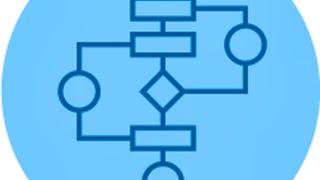Learn how to write efficient, maintainable C++ code for data-intensive applications in this hands-on course. Key application areas include scientific simulation software, statistical data processing, and computer graphics.

Vente anticipée ! Débloquez plus de 10 000 cours de Google, Microsoft et autres pour 160 €/an. Économisez maintenant.


Expérience recommandée
Ce que vous apprendrez
Software architecture using an object-oriented and a data-oriented approach
Efficient programming using language-specific features in C++
GPU and multi-core CPU software development in C++
Compétences que vous acquerrez
- Catégorie : Computer Architecture
- Catégorie : Programming Principles
- Catégorie : Algorithms
- Catégorie : Data Structures
- Catégorie : Performance Tuning
- Catégorie : Data Processing
- Catégorie : Object Oriented Programming (OOP)
- Catégorie : C++ (Programming Language)
- Catégorie : Computer Hardware
Détails à connaître

Ajouter à votre profil LinkedIn
juin 2025
54 devoirs
Découvrez comment les employés des entreprises prestigieuses maîtrisent des compétences recherchées

Il y a 5 modules dans ce cours
To follow this MOOC, you should be familiar with the fundamentals of the C++ language. In this first module however, you will find a refresher on the most important concepts needed to complete the course. You will (re)discover variable types (stack variables, references, smart pointers), containers and algorithms, classes and polymorphism. If you already master these notions but your knowledge predates the C++11 standard, we still encourage you to follow this module for up-to-date recommendations on the efficient use of C++. In particular, have a look at Lesson 4 if you are not yet familiar with the notion of ranges in C++20 and later versions.
Inclus
17 vidéos1 lecture11 devoirs
Part of the work of processing data efficiently consists in reducing the amount of computations and the complexity of the execution path. A complex execution path is often implemented to express design choices in the organization of software components. In the form of a compile-time execution framework, C++ offers a way to offload this complexity to the compilation stage and keep the execution environment simple and efficient.
Inclus
12 vidéos1 lecture10 devoirs
Memory is one of the most critical resources of a computing platform. In this module, you will learn how memory is used in the C++ language and how memory access works on different types of machines. You will translate this knowledge into code that is at the same time clearly structured and efficient.
Inclus
15 vidéos1 lecture13 devoirs
Learn to think about your program in a way that puts the critical hardware resource, memory, in the center of your thoughts. Apply these principles to discrete-event systems, a problem solving strategy with applications in all applied areas of science. Understand that data-oriented programming is not opposed to object-oriented programming but rather offers a way to model your objects in a way that accounts for your data structure, your algorithms, and your hardware.
Inclus
8 vidéos9 devoirs
This module introduces you to an amazing feature available in the C++17 and onward: the ability to parallelize an algorithm with almost no effort, using C++ parallel algorithms. You will learn that you can gain a manifold speedup with simple changes by running your code on multi-core CPUs and on GPUs. You will dive once more into the working principles of computer memories to understand how to reach substantial performance improvements, and you will link the concepts of data-oriented programming to efficient paralellism.
Inclus
15 vidéos11 devoirs
Obtenez un certificat professionnel
Ajoutez ce titre à votre profil LinkedIn, à votre curriculum vitae ou à votre CV. Partagez-le sur les médias sociaux et dans votre évaluation des performances.
Instructeurs


Offert par
En savoir plus sur Algorithms
 Statut : Essai gratuit
Statut : Essai gratuitUniversity of Illinois Urbana-Champaign

Simplilearn
 Statut : Essai gratuit
Statut : Essai gratuitJohns Hopkins University
 Statut : Essai gratuit
Statut : Essai gratuit
Pour quelles raisons les étudiants sur Coursera nous choisissent-ils pour leur carrière ?





Ouvrez de nouvelles portes avec Coursera Plus
Accès illimité à 10,000+ cours de niveau international, projets pratiques et programmes de certification prêts à l'emploi - tous inclus dans votre abonnement.
Faites progresser votre carrière avec un diplôme en ligne
Obtenez un diplôme auprès d’universités de renommée mondiale - 100 % en ligne
Rejoignez plus de 3 400 entreprises mondiales qui ont choisi Coursera pour les affaires
Améliorez les compétences de vos employés pour exceller dans l’économie numérique
Foire Aux Questions
Access to lectures and assignments depends on your type of enrollment. If you take a course in audit mode, you will be able to see most course materials for free. To access graded assignments and to earn a Certificate, you will need to purchase the Certificate experience, during or after your audit. If you don't see the audit option:
The course may not offer an audit option. You can try a Free Trial instead, or apply for Financial Aid.
The course may offer 'Full Course, No Certificate' instead. This option lets you see all course materials, submit required assessments, and get a final grade. This also means that you will not be able to purchase a Certificate experience.
When you purchase a Certificate you get access to all course materials, including graded assignments. Upon completing the course, your electronic Certificate will be added to your Accomplishments page - from there, you can print your Certificate or add it to your LinkedIn profile. If you only want to read and view the course content, you can audit the course for free.
You will be eligible for a full refund until two weeks after your payment date, or (for courses that have just launched) until two weeks after the first session of the course begins, whichever is later. You cannot receive a refund once you’ve earned a Course Certificate, even if you complete the course within the two-week refund period. See our full refund policy.
Plus de questions
Aide financière disponible,



